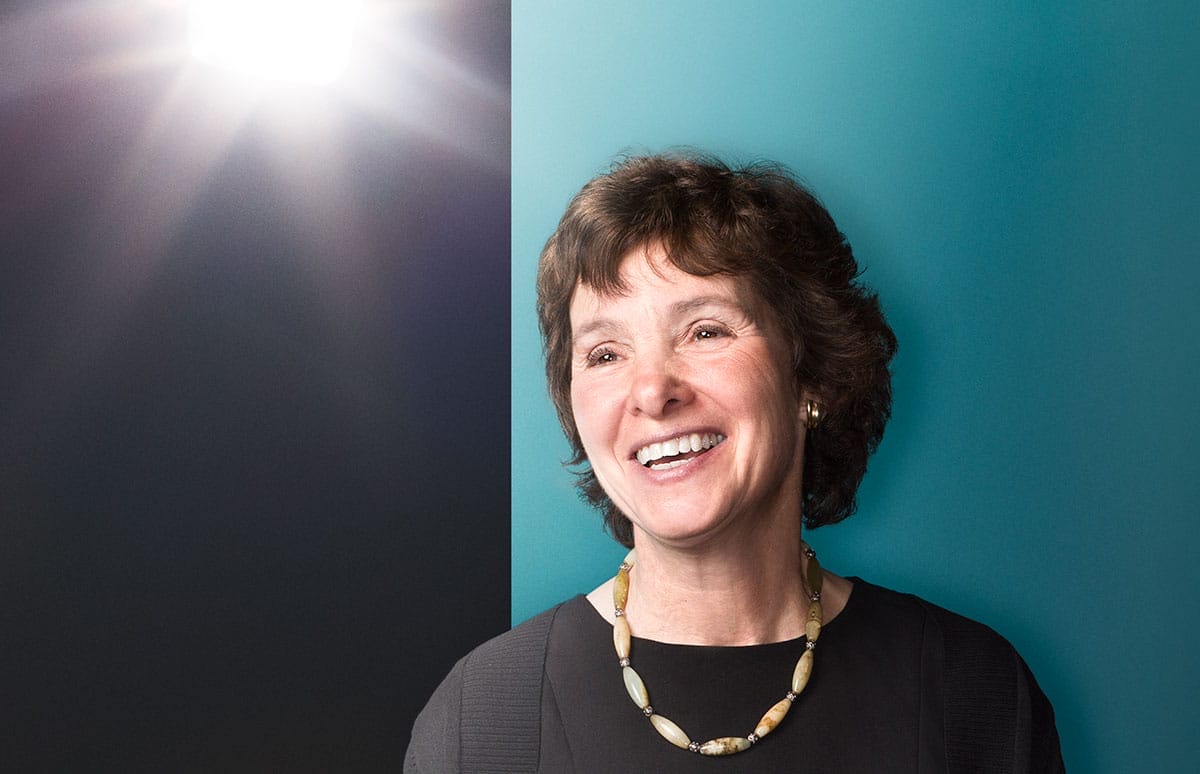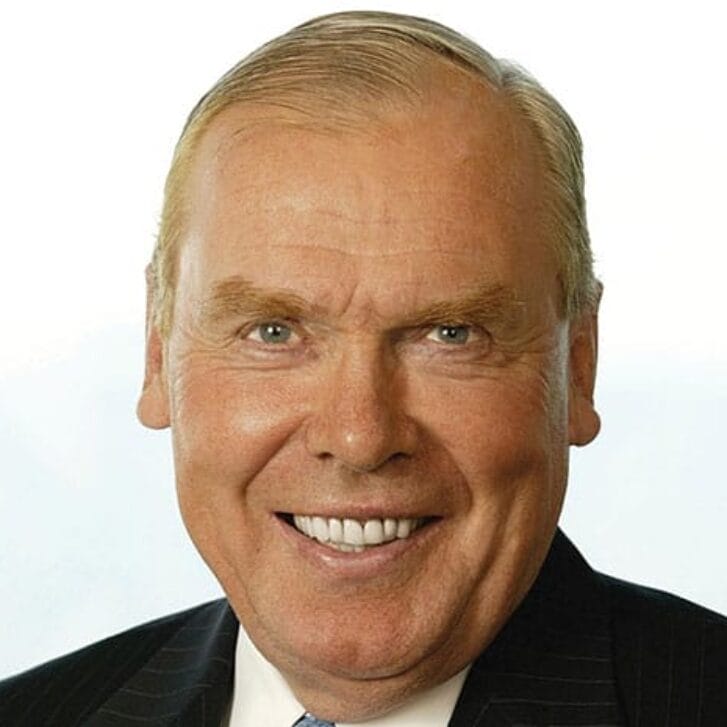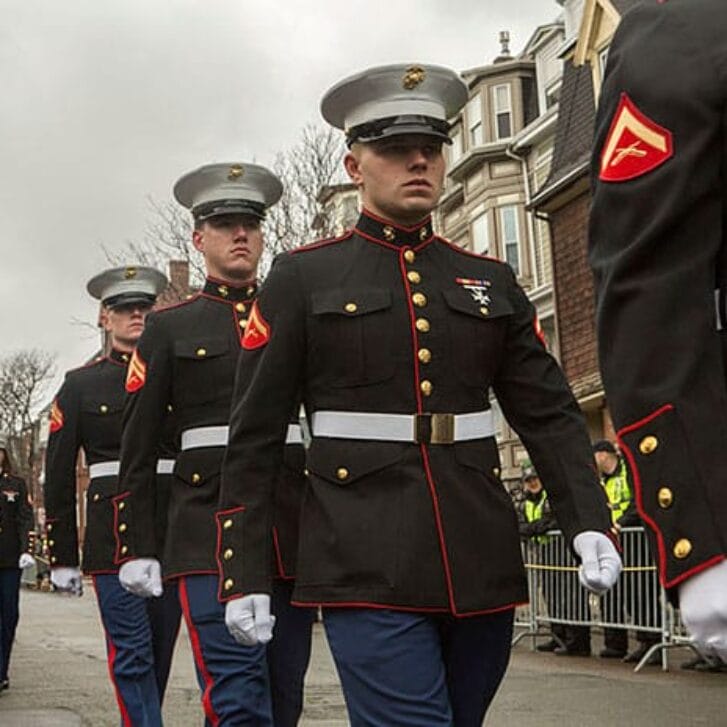Wes Gray W02 seeks nothing short of bringing down Wall Street. It’s not that he hates bankers or hedge funders, per se. It’s just that their model—serving as middlemen between investment products and consumers—is inefficient, outdated and just asking to be disrupted.
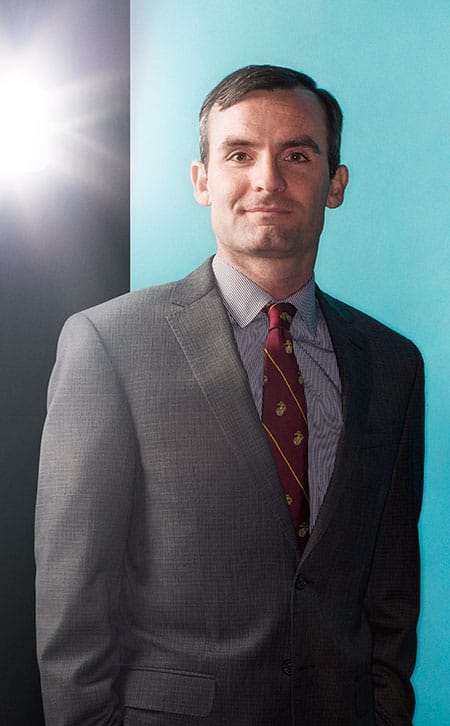
Wes Gray
For a while, disrupting Wall Street by providing low-cost, high-return products—delivering on the value of a Vanguard with the alpha of a hedge fund—was just academic theory to Gray. After an undergrad degree at Penn, he enrolled in an MBA/Ph.D. program at the University of Chicago Booth School. He detoured his life in 2004 by joining the Marines and serving his country in the Middle East, but he returned to his studies, finished his degree and earned a professorship at Drexel University. His wish to bring down Wall Street started manifesting itself as blogs about his research— how everyday investors could apply quantitative finance and behavioral economics.
Then he got a call from David Foulke WG95: “I’ve been reading your blog for a long time. I read your dissertation. I find it really interesting. Can we meet?”
They did. At Rittenhouse Square. Foulke shared how he had been running his family’s energy business, and they reminisced together about Wharton and joked about how undergrads always ruin the curves for the MBAs by scoring so high on exams. Gray invited him to be a guest speaker in his hedge fund course. They kept in touch.
Until the day Gray got a call from a billionaire who read his blog.
“I want to figure out how we can work together. I really like what you guys do. I like your research,” the man told him.
That interested billionaire turned into an “anchor tenant” needed to implement Gray’s theories full time. Gray called Foulke and put it this way: “The Popsicle stand has some chow now. We can all eat a little bit. What do you think … let’s start getting this thing rolling?”
Their next step was to contact another Wharton grad, Gray’s fraternity brother, Patrick Cleary W03, who had gone from Wharton to the Marines to Harvard Business School to Boston Consulting Group to being director of strategy for a billion-dollar private equity firm in Baltimore.
Gray asked him, “Did you ever want to be an entrepreneur?”
After arm-twisting and shin-kicking, and being tired of commuting from his family in Philly to work in Baltimore, Cleary said, “Let’s do this.”
The result is a lean, mean startup called Alpha Architect, with just over $200 million in assets under management and a freshly launched active exchange-traded fund (ETF) business that has collected nearly $50 million in assets in less than four months. Alpha Architect’s stock selection strategies are 100 percent automated and provide the same sort of tax-efficiency and transparency as robo portfolio adviser Wealthfront, the online investment management fund (coincidentally co-founded by Wharton grad Andy Rachleff W80).
Would Gray be able to take on Wall Street without his Wharton background? Perhaps. Would he be able to form a powerhouse team of Wharton grads? No. That helps explain why Gray was so eager to share his story of how MBAs and undergraduates came together to found an upstart.
Alumni everywhere seem eager to share their stories about how Wharton transformed their careers and their lives. Career trajectories inflected. Lives pivoted into new, wide-open opportunities. Call it the “Wharton Effect.”
Wharton Magazine has started to collect these tales and to share them across the wider community. The goal is to keep these stories coming and continue to share them—whether in future articles in the print edition, on the magazine’s digital platforms or across other venues around the School. (See below for how to participate.)
For this particular article, alumni reached out to us through administrators on campus or other intermediaries. Others contacted us through social media. Gray’s story and those that follow are but a small sample size. Also included throughout are quotes that alumni felt inspired enough to share on Wharton’s Facebook page. Hopefully, you are just as inspired to read them.
Submit Your Wharton Effect Story
Wharton Magazine is collecting tales of the School’s profound impact on alumni’s lives and will continue to share them. Please share your story by:
- Posting it online at http://whr.tn/wharton-effect
- Sharing it on social media with the hashtag #WhartonEffect
- Emailing it to magazine@wharton.upenn.edu
COURAGE
Jon Youshaei C13 W13 likes to joke that his entire Penn tuition would have been worth it if it afforded him just one class: Organizational Behavior taught by Adam Grant, Wharton’s Class of 1965 Wharton Professor of Management and author of the best-selling book Give and Take. Simply put, Grant taught Youshaei to love helping people, to understand that competing against one another for the same pie is not the answer. Expanding the pie is.
Still, Youshaei’s parents do not find the joke funny.
In defense of Youshaei, he’s gotten a lot more out of his education than just Grant’s life-altering change in perspective.
For starters, he is one of the youngest columnists for Forbes, TIME and The Huffington Post because Arianna Huffington came to campus in fall 2012 to speak and, simply put, Youshaei has no fear. He approached Huffington and asked if she would consider publishing his next article. She gave him her email, and when he sent her his piece, she published it. Next, he approached former classmates who worked at Forbes, Dana Tom C13 and Sam Sharf C12, and got their help pitching a piece called “The Secret Behind Twitter’s IPO: How The Hashtag Became A Worldwide Phenomenon.” He’s since followed it up with a piece about “Uberpreneurs” that became Forbes’ most-read story in the days after its publication with nearly 1 million views.
Youshaei’s fearlessness is a trend in his life. He’s reached out to David Pottruck C70 WG72, Ivanka Trump W04 and “other industry leaders I would have never met otherwise.” For example, with Pottruck, former head of Charles Schwab and now chief of Red Eagle Ventures, Youshaei cold-emailed him after graduation.
“A few months later, my best friend Matt Jayson W13 and I are sitting in Pottruck’s office, talking over coffee. Next thing I know, he invites us to his executive MBA class in the Wharton | San Francisco campus, and we’re meeting even more alumni,” Youshaei says.
Now as a YouTube product marketing manager at Google— an opportunity for which he sings the praises of Penn’s career management and the alumni network—Youshaei continues his fearless ways. On the side, he is pursuing a startup that will allow him to apply his writing and creativity to approach career and business advice in a comical, engaging yet thoughtful way, much akin to what Jon Stewart and Stephen Colbert did for news. He co-created the site, EveryVowel.com, with Dylan Petro C14 and Ankit Shah W13, and aims to help the ambitious pursue unconventional careers by sharing stories, ideas and advice.
When Youshaei, only 24, looks at all that he’s accomplished in his strong start since college, what’s his explanation?
“The Wharton Effect keeps growing in ways that I am just beginning to realize,” says the first-generation American.
Then again, his parents deserve credit too. They sent him to Penn—made it all possible by emigrating to the U.S. from Iran after the Revolution, where his dad labored on “creating something out of nothing” by launching his own Oriental rug business.
“It’s all because of my parents,” Youshaei says (without mentioning Grant’s one course again).
Connect with us about the Wharton Effect on Social Media
The great “pullquotes” sprinkled throughout this article originally were alumni comments on Wharton’s Facebook page. Share yours there, or on Twitter by mentioning @WhartonMagazine with the hashtag #WhartonEffect.
COMMUNION
Raimundo Martinez WG09 was a bit of an outlier when he was a student. He estimates he was, at 42 on convocation day, one of the 10 oldest members of his class.
He arrived at Wharton after 22 years of what most people would consider a successful career working around the world, from Italy in nuclear energy, to San Diego in fiber optics engineering, back home to Venezuela to launch a joint-venture IT firm, to Washington, D.C., and Alaska. His MBA was “a planned change” to accelerate his career and open new doors.
“So I could continue enjoying life for the second part of my career,” he says.
Martinez appears to have networked across his Wharton class as well or better than his peers 15 years his junior. Martinez hosted dinners at his apartment regularly during his days on Penn’s campus, as well as movie nights.
“I had a projector at home and high ceilings so I would have about 15 people,” he says. “And I had leadership fellow movie night, Israeli club movie night, Spaniard movie night and so on.”
His guests became close friends—for life. At a dinner during the start of his second year, he shared with them his strategy for their remaining time on campus—he wouldn’t seek out more acquaintances (people with whom he would lose contact after School) but would look to build bonds with people friends told him he should know.
Such premeditated behavior wasn’t strange. An MBA setting allows you to approach fellow classmates like this. His strategy worked too. His connections with so many fellow Wharton alums remain so powerful and intimate he cannot put it into words, though he did a pretty decent job when he wrote this on Wharton’s Facebook page:
“Personally, acquaintances in first year turn friends by second year and family after school. Turning entrepreneur after school? Call a Wharton friend who started a food cart or a global solar energy business for advice. Moving to any city on the globe? Contact the local alumni club and ask for support. Changing industry? Call a Wharton friend in that industry and get an inside view. Want to ski in Morocco? Post the question on Facebook and get 10 different views and a contact to the owner of the ski resort.”
Whether it’s picking a classmate’s brain about the cookie business Martinez is launching or having another entrepreneur bounce ideas off him, serving as best man or even the officiant in a classmate’s wedding, Martinez (who loves his current job with BP Exploration in Alaska) would drop anything for his Wharton family.
CREDIBILITY
Speaking of family, Aaron Packles W98 WG99 comes from a family of doctors, so when he left the University of Pennsylvania with a B.S. and an MBA from Wharton, he went to Wall Street armed with only his diplomas and his GPA (which had to be high since he submatriculated from undergrad into the MBA program).
“I had no connections,” he recalls. “Wharton just gave me the opportunity to face off with these firms.”
In 1998, he secured a summer associate position at Merrill Lynch, then a full-time offer, and never left. He runs a business now for Bank of America Merrill Lynch—depository institutions investment banking—after having previously served as chief operating officer of the Global M&A practice.
Ask him about the Wharton Effect, and Packles thinks back to campus, where he was doing what every other student at Wharton does—“kill yourself” with work. When he was invited to apply to the MBA program while finishing his undergraduate degree, he did … but waited and waited and waited to hear back from MBA Admissions. Weeks passed, and he never received any word. He assumed the worst but built up the courage to call the office and ask what had happened. He remembers the huge pause on the other end.
“You didn’t hear?” the administrator finally said.
Then that person asked Packles to wait. Again, there was a long pause (as the person on the other end probably ran down the hall to find someone with answers), followed by the good news that Packles had actually gotten in. The letter, it appeared, had gotten lost in the Penn mail system. Packles didn’t hold it against them.
“I was jumping up and down,” Packles says. “I shot through the roof.”
Packles continues to feel that Wharton Effect—not just in the success of his career but in how it’s allowed him to help others shoot through the roof with success. The night before Wharton Magazine interviewed him for this article, Packles had attended a recruiting event where he spoke with current Wharton MBA students. He knew what they were going through, he knew their professors and he didn’t have to waste time establishing their credibility as potential hires.
“[Wharton] literally eliminates the whole conversation around establishing credibility,” he says. “Knowing that they have the background of academics and ethics … knowing that that has been instilled … that matters a lot.”
FORTUITY
Antonio Carrillo Rule WG93 agrees with Packles that the credibility imparted by a Wharton degree is unrivalled—it helped him succeed at Trinity Industries, a U.S. company. Fitting in to corporate America isn’t lost on Carrillo. “As a Mexican, you need something in addition [to] just your normal results,” he says.
Carrillo has since gone on to become CEO of Mexichem, the only non-family member to run one of Mexico’s family business empires. But Carrillo credits Wharton for more—for affording him essentially everything that brings him joy in life: his family.
That makes his decision to go to Wharton the “most important decision” in his life.
Two years after he left Wharton, his friend, Alejandro Ramirez WG94 (now head of Cemex in Costa Rica), set up Carrillo with his wife’s best friend.
“Nothing fancy, a bind date,” Carrillo remembers.
Two decades, a marriage and two children later, Carrillo counts himself as a very lucky man. He will tell you that all of it would not have been possible had he not gone to Wharton. His education, his ability to move from a pre-Wharton engineering career into pre-eminent roles at manufacturing multinationals. Friends like Ramirez who watched over him on campus during the difficult days as a student after Carrillo’s father died.
“It is something that always stays in your mind and your heart,” Carrillo says.
Still, how much Wharton Effect goes into creating a CEO—a person who heads up a company with $7 billion in revenue operating in 34 countries with 20,000 employees? Does not a man or woman of that caliber create himself or herself?
“I am what I am because of everything I have been through,” Carrillo explains. “I couldn’t have done it without Wharton,” adding that what was also involved was sheer luck—particularly the kind of fortuity that leads one to meet his true love through his former classmate’s wife.
DETERMINATION
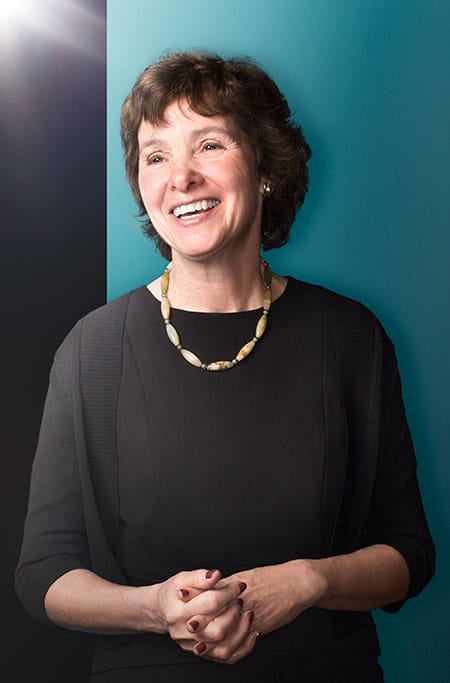
Ellen Wolf
Ellen Wolf WG79 had a sense that she wanted to get into business before her husband came to Penn for his Ph.D. Although an art history major at Duke, she had taken economics and accounting classes her senior year and loved them. At Penn, she worked in alumni relations, then in the library, but she knew she wanted to go into public accounting. Night and summer courses at Wharton led her eventually to the full-time MBA program, one step closer to her dream career.
That dream career was not a given. It was ambitious. As Wolf relates, women were just breaking into the business world in the late ’70s.
“Particularly for women, you needed the high credentials just to get an interview or a job at that time,” she says.
The “Big Eight” firms recruited on campus, and she interviewed with all of them. During one, she recalls, the man who interviewed her spent the entire time talking about her husband and how he felt about her working. In such an environment (but not with that employer), she landed a job at what was then Deloitte Haskins & Sells.
Ambition drove her further during her eight-year tenure at Deloitte and beyond. She left accounting and landed at a Baby Bell after the AT&T breakup. She got a taste for due diligence and M&A work. More importantly for her career, the experience led to her first chief financial officer role at Bell Atlantic Mobile in 1994. She progressed to another CFO role, to another and still another—with American Water Works Co., then with an uranium enrichment firm USEC Inc., and then back to utilities and American Water. She retired in 2013.
The most amazing thing about Wolf’s trajectory is that it wasn’t paired with clear direction. As she tells her story, she knew once graduating from Wharton that she wanted to go into public accounting and maybe become a CFO—but beyond that? She did not have a fiveor 10-year plan. In describing her career, she uses words like “ended up” and “it was not a jump that I expected.” Whether you believe in events transpiring for a reason or because of a little of Carrillo’s luck, at the foundation of Wolf’s career—what made it possible for doors to open so wide for a woman at that time—was Wharton. She clearly identifies herself as a Wharton person.
“Someone who is ambitious, but that ambition is backed with capability,” she says.
AWE
In an unassuming classroom in Steinberg Hall-Dietrich Hall, Shannon Munyan W10 listened to a discussion among her professor, Jonah Berger, and her classmates in Consumer Behavior about what makes content contagious. Marketing Associate Professor Berger led the class to an important discovery—one he would share with the world five years later in a best-selling book called Contagious—that is, the power of awe.
“From that day, I knew that I wanted ‘awe,’” Munyan recalls. “I resolved to find and create awe in the world.”
Six years later and 7,000 miles away from Philadelphia, Munyan is doing just that. In Dubai. Why does Dubai make sense for a woman who grew up in Alexandria, Virginia? That answer takes us to Los Angeles, where after Penn she tried to break into the entertainment business. She had one job offer— an uncompensated internship for reality TV—and nothing else to lose when an opportunity to travel to the Middle East opened up. Once there, she interviewed mostly with banks, but “through an amazing stroke of luck, due in large part to graduating from Wharton,” she was offered a chance at the region’s largest media company, MBC. Still, Munyan was eager to have more immediate impact.
“My thoughts settled—catapulted, more like—back to that lesson in Consumer Behavior. If I wanted to inspire awe, I had to find something awesome to do,” she says.
She resolved to learn Arabic.
“If I spoke Arabic, I would be a sensation.”
Applying the discipline she honed at Wharton, she learned to read, write and speak Arabic fluently after only 15 months. Through the experience, she found her opportunity to create awe. When practicing Arabic on Twitter, she realized the need in the region for Arabic speakers to learn idiomatic English. She went from this epiphany, to creating an Arabic hashtag (“American slang,” translated), to inventing her own YouTube show, to taking calls from writers, directors and the media. Shortly thereafter, she was acting in the top Ramadan comedy Wi-Fi.
“The sharing exploded,” she says.
Currently, Munyan continues to act, produce and translate, as well as consult on behalf of multinational companies and help elite officials improve their English communication skills. And she is seeing the bigger picture of her impact—bringing what the West offers (from technology to health consciousness) in a way her Middle Eastern audience appreciates.
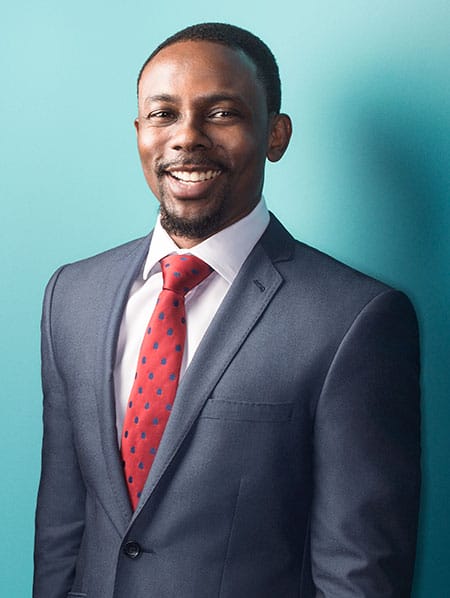
Tunde Ojo
AMBITION
Tunde Ojo WG12 tells his story all the time. How he was an asset manager in Lagos, Nigeria, and knew about Wharton from acquaintances who were alumni, people who had already felt the Wharton Effect themselves and returned home successful.
“The brand was very strong locally,” he remembers.
How he decided to become a part of the brand himself and set off for Philadelphia knowing “literally no one in the U.S.” He paid for his apartment through a wire transfer from Nigeria. How he met classmates— friends—immediately during Pre-Term. One in particular sticks out in his memory, a classmate from Finland who sold his business to come to Wharton. The man’s story made Ojo realize just what he was getting himself into.
Fast-forward the story to his second year and Ojo’s job search. Like any smart student, he was researching alumni to contact on WhartonConnect.com, and he came across someone at Harding Loevner LP. Ojo pitched himself on email and got a phone call. The alum, Pradipta Chakrabortty WG08, mentioned how the firm wasn’t hiring but that he was fine just talking. After 10 minutes of business, the conversation pivoted toward Nigerian stocks, a subject both men could debate passionately— after which the alum asked Ojo to send him his resume.
“This guy just told me 10 minutes ago he wasn’t hiring!” Ojo still exclaims to this day.
A couple of weeks later, Chakrabortty called Ojo and asked him if he was interested in an interview, and after some preparation help from Chakrabortty, Ojo hit it out of the proverbial park and earned a job as an equity research analyst covering frontier markets. With an alumnus always getting his back (while being his boss), Ojo’s career has been “propelled” ahead.
“The epitome of it all has been that I became a portfolio manager in June 2014, just two years after joining the firm,” he says. “I came in with a very good brand, and I have been able to prove that I can do it.”
Wharton propelled Ojo into a circle of friends and classmates, then a career that would not have been possible otherwise, and he plans only to build on it. He foresees himself remaining at Harding Loevner for a long time, becoming partner and along the way, helping to bring new Wharton talent on board.
CREATIVITY
After hearing stories from alumni about the Wharton Effect, the question might arise over and over—about whether Wharton transforms people and makes them successful, or takes people with innate skills and ambition and trains them to become pre-eminent in their fields.
Harkening back to Carrillo, the fateful view is that successful people are the combination of the entirety of their life’s events and experiences.
Another way to explain the nature-nurture approach is how Wolf does: “Wharton gets your foot in the door. Once you’re in the door, [it’s] up to you.”
Or perhaps the answer is that Wharton attracts people of high caliber and teaches them to no longer just see what’s there—but to see what’s not there and create it, as Munyon believes.
“It is our responsibility to create, not grasp,” the Dubai success story says.
In any event, the Wharton Effect is powerful enough to even impress those with the highest bars for themselves and the utmost confidence.
“In short, Wharton has been the most powerful and positive transformational experience in my life and one that continues to provide value in every way,” as Martinez puts it.




















